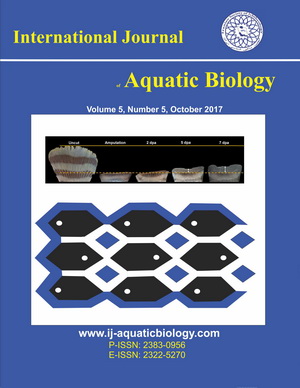Effects of dietary olive leaf extract on intestinal immune-related gene expressions in common carp, Cyprinus carpio
Downloads
This study aimed to investigate the effects of dietary olive leaf extract (OLE) on intestinal immune-related genes expression of tumor necrosis factor alpha (TNFa), interleukin 1 beta (IL1b), lysozyme (LYS), and mucin2 (MUC2). For this purpose, common carp (~15 g) were fed with 0 (control), 0.1 (OLE-0.1), 0.5 (OLE-0.5) and 1 (OLE-1) % OLE diets for eight weeks. The fish were sampled after one and eight weeks to study intestinal TNFa, IL1b, LYS, and MUC2 gene expressions. The results showed that dietary OLE administration significantly up-regulated intestinal TNFa gene expression after one (all OLE-treated groups) and eight (OLE-0.5) weeks. Moreover, OLE-0.1 and OLE-1 groups showed up-regulated intestinal IL1b expression, after one week, all the OLE-treated fish had significantly higher intestinal IL1b expression, after eight weeks. OLE had no significant effects on LYS gene expression after one week, but OLE-0.1 and OLE-0.5 had significantly higher gene expressions after eight weeks. OLE-0.1 and OLE-1 had significantly lower MUC2 gene expression after one week, but all OLE-treated fish had significantly higher MUC2 gene expression after eight weeks. In conclusion, dietary 0.1-0.5% OLE supplementation is suitable to support common carp intestinal health.
Downloads
Abtahi B., Yousefi M., Kenari A.A. (2013). Influence of dietary nucleotides supplementation on growth, body composition and fatty acid profile of Beluga sturgeon juveniles (Huso huso). Aquaculture Research, 44: 254-260.
Amirkhani N., Firouzbakhsh F. (2015). Protective effects of basil (Ocimum basilicum) ethanolic extract supplementation diets against experimental Aeromonas hydrophila infection in common carp (Cyprinus carpio). Aquaculture Research, 46: 716-724.
Baba E., Acar íœ., Yılmaz S., Zemheri F., Ergí¼n S. (2018). Dietary olive leaf (Olea europea L.) extract alters some immune gene expression levels and disease resistance to Yersinia ruckeri infection in rainbow trout Oncorhynchus mykiss. Fish and Shellfish Immunology, 79: 28-33.
Chakraborty S.B., Hancz C. (2011). Application of phytochemicals as immunostimulant, antipathogenic and antistress agents in finfish culture. Reviews in Aquaculture, 3: 103-119.
Chakraborty S.B., Horn P., Hancz C. (2014). Application of phytochemicals as growth-promoters and endocrine modulators in fish culture. Reviews in Aquaculture, 6: 1-19.
Edirisinghe S., Dananjaya S., Nikapitiya C., Liyanage T., Lee K.-A., Oh C., Kang D.-H., De Zoysa M. (2019). Novel pectin isolated from Spirulina maxima enhances the disease resistance and immune responses in zebrafish against Edwardsiella piscicida and Aeromonas hydrophila. Fish and Shellfish Immunology, 94: 558-565.
Fazelan Z., Vatnikov Y.A., Kulikov E.V., Plushikov V.G., Yousefi M. (2020). Effects of dietary ginger (Zingiber officinale) administration on growth performance and stress, immunological, and antioxidant responses of common carp (Cyprinus carpio) reared under high stocking density. Aquaculture , 518: 734833.
Giri S.S., Sen S.S., Chi C., Kim H.J., Yun S., Park S.C., Sukumaran V. (2015). Effect of guava leaves on the growth performance and cytokine gene expression of Labeo rohita and its susceptibility to Aeromonas hydrophila infection. Fish and Shellfish Immunology, 46: 217-224.
Hoseinifar S.H., Dadar M., Khalili M., Cerezuela R., Esteban M.í. (2017). Effect of dietary supplementation of palm fruit extracts on the transcriptomes of growth, antioxidant enzyme and immune-related genes in common carp (Cyprinus carpio) fingerlings. Aquaculture Research, 48: 3684-3692.
Hoseinifar S.H., Khodadadian Zou H., Paknejad H., Ahmadifar E., Van Doan H. (2018a). Non-specific immune responses and intestinal immunity of common carp (Cyprinus carpio) fed Jujube (Ziziphus jujube) fruit extract. Aquaculture Research, 49: 2995-3003.
Hoseinifar S.H., Khalili M., Rufchaei R., Raeisi M., Attar M., Cordero H., Esteban M.í. (2015). Effects of date palm fruit extracts on skin mucosal immunity, immune related genes expression and growth performance of common carp (Cyprinus carpio) fry. Fish and Shellfish Immunology, 47: 706-711.
Hoseinifar S.H., Zou H.K., Van Doan H., Harikrishnan R., Yousefi M., Paknejad H., Ahmadifar E. (2019). Can dietary jujube (Ziziphus jujuba Mill.) fruit extract alter cutaneous mucosal immunity, immune related genes expression in skin and growth performance of common carp (Cyprinus carpio)? Fish and Shellfish Immunology, 94: 705-710.
Hoseinifar S.H., Yousefi S., Capillo G., Paknejad H., Khalili M., Tabarraei A., Van Doan H., Spanò N., Faggio C. (2018b). Mucosal immune parameters, immune and antioxidant defence related genes expression and growth performance of zebrafish (Danio rerio) fed on Gracilaria gracilis powder. Fish and Shellfish Immunology, 83: 232-237.
Jutfelt F. (2011). Barrier function of the gut. Encyclopedia of Fish Physiology: From Genome to Environment, 2: 1322-1331.
Karimi M., Paknejad H., Hoseinifar S.H., Shabani A., Mozanzadeh M.T. (2020). The effects of dietary raffinose on skin mucus immune parameters and protein profile, serum non-specific immune parameters and immune related genes expression in common carp (Cyprinus carpio L.). Aquaculture , 520: 734525.
Sarhadi I., Alizadeh E., Ahmadifar E., Adineh H., Dawood M.A. (2020). Skin mucosal, serum immunity and antioxidant capacity of common carp (Cyprinus carpio) fed artemisia (Artemisia annua). Annals of Animal Science, (In Press).
Saurabh S., Sahoo P. (2008). Lysozyme: an important defence molecule of fish innate immune system. Aquaculture Research, 39: 223-239.
van der Marel M., Adamek M., Gonzalez S.F., Frost P., Rombout J.H., Wiegertjes G.F., Savelkoul H.F., Steinhagen D. (2012). Molecular cloning and expression of two β-defensin and two mucin genes in common carp (Cyprinus carpio L.) and their up-regulation after β-glucan feeding. Fish and Shellfish Immunology, 32: 494-501.
Yarahmadi P., Miandare H.K., Fayaz S., Caipang C.M.A. (2016). Increased stocking density causes changes in expression of selected stress-and immune-related genes, humoral innate immune parameters and stress responses of rainbow trout (Oncorhynchus mykiss). Fish and Shellfish Immunology, 48: 43-53.
Yousefi M., Hoseinifar S.H., Ghelichpour M., Hoseini S.M. (2018). Anesthetic efficacy and biochemical effects of citronellal and linalool in common carp (Cyprinus carpio Linnaeus, 1758) juveniles. Aquaculture, 493: 107-112.
Yousefi M., Vatnikov Y.A., Kulikov E.V., Ghelichpour M. (2019). Change in blood stress and antioxidant markers and hydromineral balance of common carp (Cyprinus carpio) anaesthetized with citronellal and linalool: Comparison with eugenol. Aquaculture Research, 50: 1313-1320.
Zemheri-Navruz F., Acar íœ., Yılmaz S. (2019). Dietary supplementation of olive leaf extract increases haematological, serum biochemical parameters and immune related genes expression level in common carp (Cyprinus carpio) juveniles. Fish and Shellfish Immunology, 89: 672-676.








